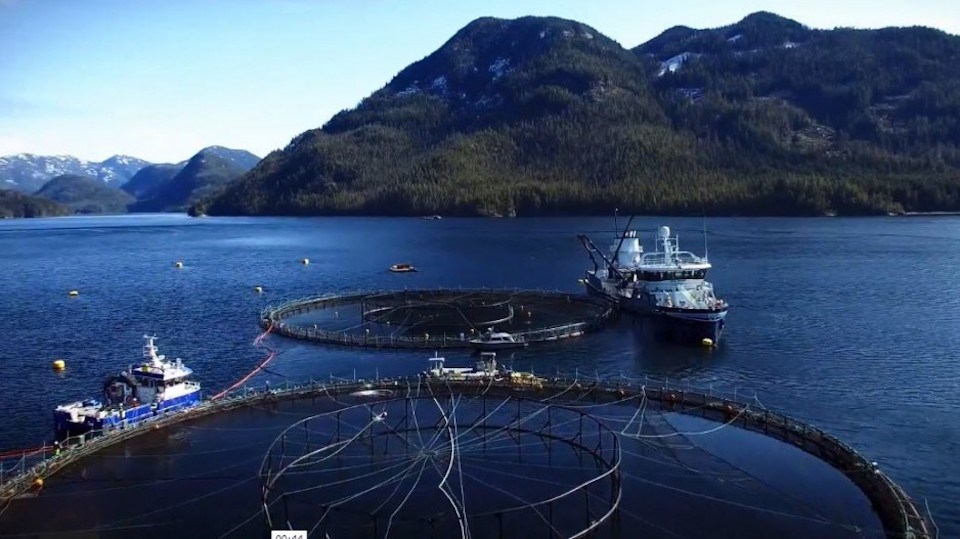Premier John Horgan has waded into the chummed waters of fish farm politics with a letter calling on Prime Minister Justin Trudeau to have some transition plan for the salmon farming sector before it starts killing jobs in B.C.
Horgan is calling on Trudeau both to have some transition plan in place for the salmon farming industry, and to be mindful of the indigenous rights of First Nations that support fish farming.
Meanwhile, Bob Chamberlin, chairman of the First Nations Wild Salmon Alliance, is calling on the federal fisheries minister to "stay the course" in the federal government's plan to phase out open-net fish farms in B.C.
There are 79 federal salmon farm licences in B.C. that expire in June, and the salmon farming industry fears they may not be renewed.
“Regrettably there is widespread concern in coastal communities that your government is poised to make a decision in coming days that will eliminate many if not all salmon farming licences,” Horgan says in his letter to Trudeau, according to Seawest News.
“If true, this action would eliminate hundreds of jobs at a stroke and undermine the economy of dozens of coastal communities.”
Horgan also says not renewing licences for those salmon farms that are supported by First Nations would “fly in the face of our governments’ commitment to UNDRIP (the United Nations Declaration on the Rights of Indigenous People).”
While he support's Horgan call for a federal transition plan to assist workers laid off through fish farms closures, Chamberlin said First Nations that want fish farms phased out are now worried about Horgan’s letter.
He said it has “caused quite a bit of a stir” among B.C. chiefs who want to see salmon farms phased out over concerns they are having a negative impact on wild salmon, which are an important food source for many B.C. First Nations.
“This is not solely about jobs,” Chamberlin said. “What we’re talking about is food security for the vast number of First Nations across the province.”
While a number of First Nations in B.C. support the industry and are actively involved in it, the vast majority of First Nations in B.C. oppose open-net fish farming, Chamberlin said. They want all open-net salmon farms phased out.
Asked if he thought First Nations who support the industry should be allowed to have a say on whether fish farms are allowed, Chamberlin said he didn't think they should.
"We have to balance the broader need," he said. "And the broader need and dependency on healthy and abundant wild salmon stocks far outstretches a community and the territory. It would be wonderful if those fish just stayed in one territory and then the nations make the decision to compromise their food availability, but should we be able to impact our neighbours far and wide from enjoying aboriginal rights?"
"I don't think there is any room in the B.C. ocean for open-net cage fish farms," Chamberlin said.
Horgan's concern for job losses in the salmon farming sector seems to shift all blame for any decision on fish farms to the federal government when, in fact, fish farming is something of a joint provincial-federal jurisdiction, although the federal government does have the ultimate say over what happens in the oceans.
The federal government issues licences, but the provincial government issues tenure. And the Horgan government is generally on the same page as the federal government, when it comes to open-net salmon farms.
Horgan's mandate to the new minister of Land, Water and Resource Stewardship instructs her “to develop and implement a responsible plan, including technology based solutions, to transition from open-net finfish aquaculture.”
So any transition plan for the industry and workers may not be the sole responsibility of the federal government, but the provincial government as well.
The Trudeau government has already shut down about a quarter of the salmon farms in B.C. It did not renew licences for 19 salmon farms in the Discovery Islands, as per a recommendation of the Cohen Commission.
The commissioner had recommended those salmon farms be removed, since they are in the migration path of Fraser River sockeye, unless the fisheries minister could be satisfied they posed no more than a minimal risk to wild salmon. DFO's own scientists, having reviewed the science on disease transfer from farmed to wild salmon, determined that salmon farms in fact posed no more than a minimal risk to wild salmon.
The Trudeau government ordered the salmon farms shut down anyway, despite DFO's own scientific advice, and concerns of First Nations that oppose salmon farming may have had something to do with that decision.
In the 12 years since the Cohen Commission inquiry was held, the federal and provincial governments have adopted UNDRIP in one form or another, and have been giving more weight to the principle of First Nation consent for activities in their traditional territories. And in the Discovery Islands case, many First Nations have vigorously opposed salmon farms and have said they do not have their consent.



